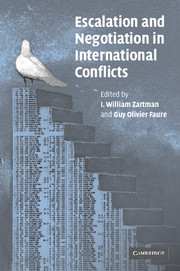Book contents
- Frontmatter
- Contents
- Contributors
- PART I Introduction
- PART II Escalation Forms and Outcomes
- PART III Negotiating out of Escalation
- PART IV Conclusion
- 13 Lessons for Research
- 14 Strategies for Action
- Index
- About the Processes of International Negotiation (PIN) Network at the International Institute for Applied Systems Analysis (IIASA)
14 - Strategies for Action
Published online by Cambridge University Press: 10 October 2009
- Frontmatter
- Contents
- Contributors
- PART I Introduction
- PART II Escalation Forms and Outcomes
- PART III Negotiating out of Escalation
- PART IV Conclusion
- 13 Lessons for Research
- 14 Strategies for Action
- Index
- About the Processes of International Negotiation (PIN) Network at the International Institute for Applied Systems Analysis (IIASA)
Summary
Confronted with the possibility of an escalation or caught in the gears of an escalation process, the practitioner, whether statesman, diplomat, politician, lawyer, or businessperson, has to react in real time. He or she must understand the situation, but also has to act and to do this within a set of constraints. Henry Kissinger, having been both an analyst and a statesman, provides an extremely instrumental description of the particulars of the task of each one:
The analyst can choose which problem he wishes to study, whereas the statesman's problems are imposed on him. The analyst can allot whatever time is necessary to come to a clear conclusion; the overwhelming challenge to the statesman is the pressure of time. The analyst runs no risk. If his conclusions prove wrong, he can write another treatise. The statesman is permitted only one guess; his mistakes are irretrievable. The analyst has available to him all the facts; he will be judged on his intellectual power. The statesman must act on his assessments that cannot be proved at the time that he is making them; he will be judged by history. (Kissinger 1995, pp. 27–28)
What makes this book especially relevant in terms of added value is that it offers to practitioners something more than they can draw from their own experiences. The point is to induce from research, which is based on real-world cases, effective actions.
- Type
- Chapter
- Information
- Escalation and Negotiation in International Conflicts , pp. 309 - 324Publisher: Cambridge University PressPrint publication year: 2005



